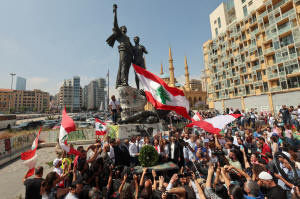Lebanese security chief fears political paralysis, social collapse
 Send a link to a friend
Send a link to a friend
 [June 03, 2022]
BEIRUT (Reuters) - A senior Lebanese
security official has said the risk of political paralysis has increased
since an election produced a fractured parliament last month, warning of
a possible "disaster" because there is no majority to legislate. [June 03, 2022]
BEIRUT (Reuters) - A senior Lebanese
security official has said the risk of political paralysis has increased
since an election produced a fractured parliament last month, warning of
a possible "disaster" because there is no majority to legislate.
Major General Abbas Ibrahim also said he was concerned about social
instability, saying this worried him more than political instability in
a country suffering one of the world's sharpest financial meltdowns.
"The results of this election could cause a disaster since we have large
political blocs with widening gaps between them on various issues and no
majority to pass laws," Ibrahim told General Security magazine, an
official publication of his security agency, which was published on
Thursday.
The May 15 election, Lebanon's first since its economy collapsed in
2019, resulted in the heavily armed, Iran-backed Hezbollah group and its
allies losing their majority.
Reform-minded newcomers and the Saudi-aligned Lebanese Forces - a
Christian party - gained seats.
Analysts have said the more fractured legislature increases the chance
of political paralysis and tension among Lebanon's fractious
politicians, at a time when the country is in dire need of government
decisions to address the economic crisis.
[to top of second column]
|

People hold Lebanese flags as newly-elected Lebanese independent
lawmakers stand together at Martyrs' Square before the Lebanese
parliament convenes for the first session post-election where they
are expected to elect speaker and deputy speaker, in Beirut, Lebanon
May 31, 2022. REUTERS/Aziz Taher

The meltdown has sunk the Lebanese pound by more than
90% since 2019, frozen depositors out of their savings in the
banking system, and led poverty to soar.
"The people have a right to object and raise their voice over the
collapse of the Lebanese pound but we don't want matters to turn
into chaos and we are working very hard to prevent the country from
entering social chaos," Ibrahim said.
The outgoing government reached a draft IMF agreement in April,
conditional on Beirut enacting reforms that its politicians have
long failed to deliver.
Parliament narrowly re-elected veteran Shi'ite Muslim politician
Nabih Berri as speaker this week.
(Writing by Lina Najem; Editing by Tom Perry)
[© 2022 Thomson Reuters. All rights
reserved.]
This material may not be published,
broadcast, rewritten or redistributed.
Thompson Reuters is solely responsible for this content. |